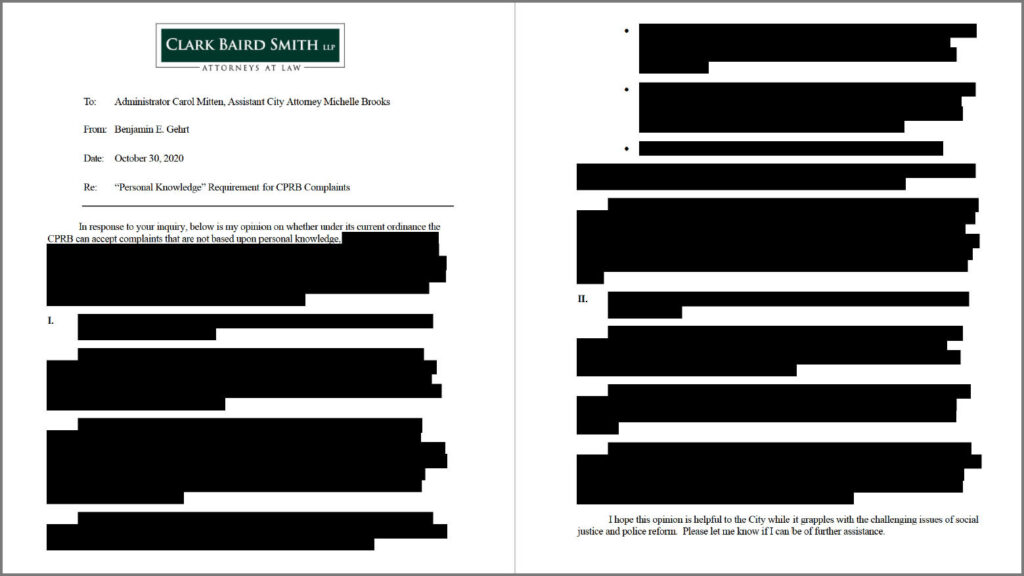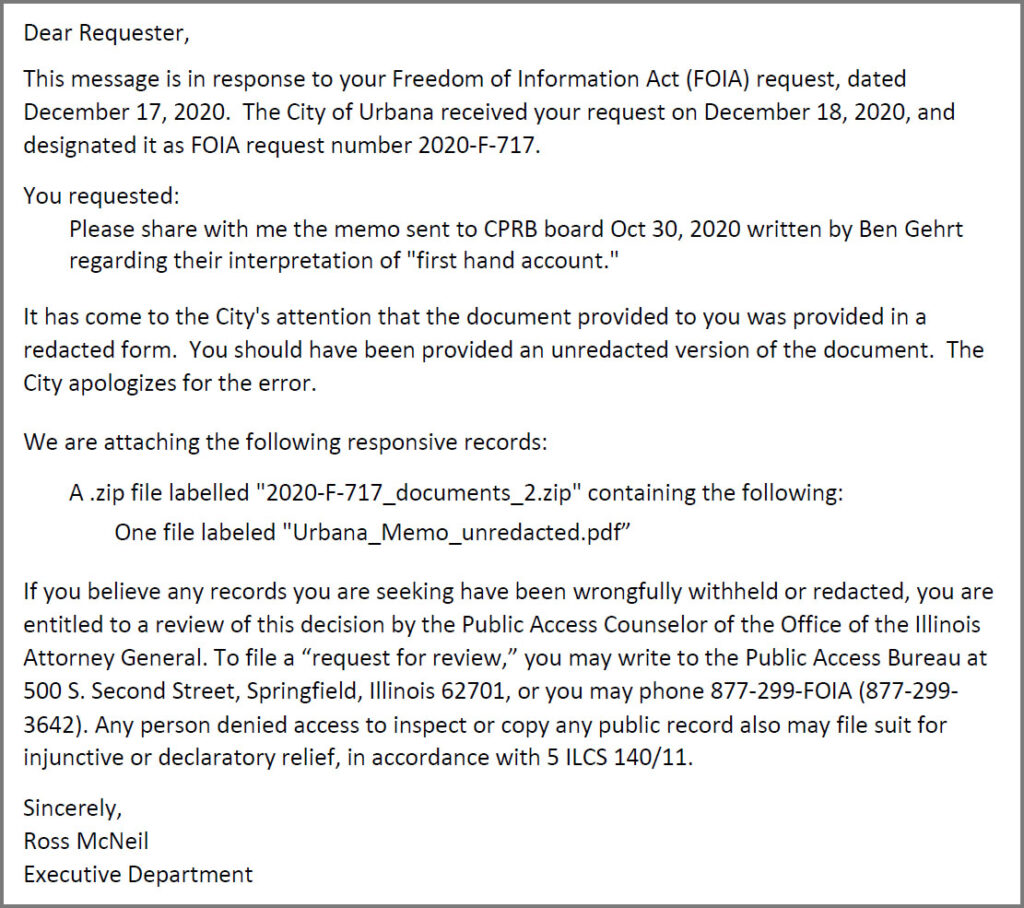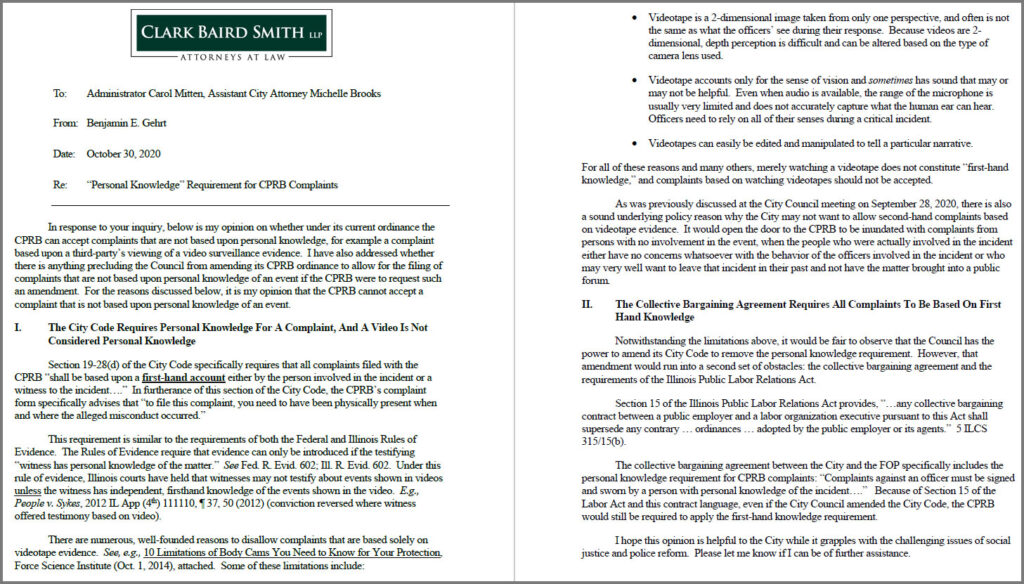On November 2nd, 2020, Urbana City Administrator Carol Mitten spoke about a mysterious memo regarding the legality of the obstacles she had placed in front of Urbana residents attempting to submit police complaints. The memo was in regards to the filing of Civilian Police Review Board (CPRB) complaints based on video evidence, and Mitten promised to make the memo available to the public. The video of that statement, and some more backstory, can be seen in this article:
Urbana City Administrator Tattles on Police Review Board in Regards to Complaint Filing Requirements
Mitten never followed up on her promise to make the memo available to the public, so one Urbana resident sent a Freedom of Information Act (FOIA) Request asking for a copy. This is the document that the City provided to that requester eleven days later (click for full PDF):

This is a typical ploy from the City of Urbana when residents ask for public records. The posture of the City is to maximally deny access – a posture repeatedly documented on Check CU. Many requesters are snubbed in exactly the same way, end up with nothing useful at all, and walk away defeated.
After consulting with Check CU, the requester took further steps to complain to the CPRB and also to their Alderman, specifically citing Mitten’s promise to make the memo public. Had the requester not had the wherewithal to take things further, this laughably redacted document is where things would have ended.
Ross McNeil, an attorney working as a contractor for the City of Urbana, issued a revised response, giving no explanation for why the initial memo was almost completely redacted:

And the requester finally received the document that was promised to the public more than two months prior (click for full PDF):

It is not surprising that Mitten did not wish to make this memo publicly available, and that the City attempted to further conceal it when a resident sent a FOIA request. Mitten heralded this memo as a legal interpretation, but it reads more like poorly crafted propaganda.
The memo was written by Benjamin Gehrt, an attorney hired by Mitten. Gehrt starts by citing City Code, but then he introduces the requirement written on the CPRB complaint form that the complainant must have been “physical present” at the site of the incident in order to issue a complaint. Gehrt seems to use the complaint form as evidence, but this physical presence requirement is written nowhere in City Code, and it was Carol Mitten herself who invented the “physically present” language in her new version of the complaint form on June 24, 2020.
Gehrt claims that video makes for poor evidence, including such arguments as, “Because videos are 2-dimensional, depth perception is difficult and can be altered based on the type of camera lens used.” He even cites a September City Council meeting discussion to support his argument. It is hard to believe that Mitten did not simply coach Gehrt on exactly what she wanted him to write.
What Gehrt fails to do is provide a convincing legal argument. Gehrt tries to confuse the issue by conflating witnesses, rules of evidence, and what can spawn a police complaint. Urbana’s CPRB complaint process is not a federal criminal trial, it is a conduct review.
If Gehrt and Mitten wish to compare Urbana’s police complaint process to the evidentiary process in a criminal hearing, then the correct analogy to the question, “What can spawn a police conduct review?” is, “What can spawn a police investigation?” The answer to the latter question is, virtually anything. A mere inkling by a restless police office can result in that officer investigating for possible criminal conduct.
If Mitten thinks that an argument to authority wins the day (and it does not seem to be the case that Benjamin Gehrt is a competent authority), then it should be noted that no fewer than three other attorneys (two of whom are members of the CPRB) have disagreed with Mitten’s/Gehrt’s claim.
Check CU recently published another article which discusses this issue, and it contains a video of the CPRB members, Carol Mitten, and Benjamin Gehrt discussing the physical presence requirement:
Urbana Police Review Board Continues to Struggle with Their Own Ordinance
This is the state of transparency and police oversight in Urbana in 2021: residents struggle simply to acquire the information needed to understand how the City is actively snubbing police oversight. At this rate, meaningful police reform will never happen, and there is good reason to think that in Urbana, things are currently moving in the direction of less oversight and less accountability.
Are you having trouble acquiring public records in the Champaign Urbana area? Feel free to contact Check CU and we’ll try to help.

Umm…the city admitted to having erred and offered the requestor an apology for the same.
Not too shabby. Does that signal a willing change in FOIA compliance from the executive office?
Well, it is certainly better than forcing the requester to go through the Attorney General’s Office, or filing a lawsuit (as many Urbana requesters end up having to do).
But the FOIA law doesn’t say “deny everything you can and only give records after you get caught doing something wrong by a savvy requester.”
The FOIA says (directly from the statute):
“Restraints on access to information, to the extent permitted by this Act, are limited exceptions to the principle that the people of this State have a right to full disclosure of information relating to the decisions, policies, procedures, rules, standards, and other aspects of government activity that affect the conduct of government and the lives of any or all of the people. The provisions of this Act shall be construed in accordance with this principle. This Act shall be construed to require disclosure of requested information as expediently and efficiently as possible and adherence to the deadlines established in this Act.”
If you think the City’s conduct in this instance was “not too shabby”, then I think we disagree on what “shabby” means.
I wonder if the Requestor accepted the apology.
How bout an SNL sketch featuring Mike Meyers saying “not too shabby?”